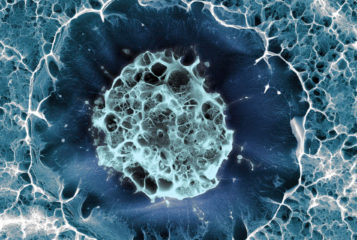Men with erectile dysfunction following prostate surgery were able to have intercourse again after receiving an experimental stem cell therapy using cells taken from their own abdomen, a Danish study has shown.
Six months after undergoing a one-time stem cell treatment, eight out of 21 men enrolled in the clinical trial were able to have sex without the use of other medicines or implants.
'This is the first time stem cell therapy has allowed patients to recover sufficient erectile function to enable intercourse,' said Dr Martha Haahr of Odense University and lead researcher of the phase I clinical trial.
Doctors used liposuction to collect fat from the patient's abdomen, from which stem cells were isolated and then injected into the patient's penis. 'We do not cultivate the cells or change them in any way,' said Dr Haahr.
The procedure was performed under general anaesthesia and patients were discharged the same day. Once injected, the stem cells begin to change into muscle and nerve cells, as well as the endothelial cells that line blood vessels.
Within six months, eight of the 21 men involved reported that they had recovered sufficient erectile function to achieve penetrative sex. None reported any significant side effects. Prostate surgery can affect bladder control, as well as erectile function, and only men who were continent reported the recovered erectile function.
'These men had previously seen no effect from traditional medical treatment and continue to have good erectile function after 12 months follow-up, indicating that this might be a long-term solution,' said Dr Haahr, who presented the findings at the European Association of Urology's (EAU) annual meeting in London.
'This is interesting and novel research,' said Professor Jens Sønksen, member of the EAU Scientific Congress Committee and not involved with the research. He said the study was 'preliminary and more research is needed on the topic', but added that 'there is no doubt that stem cell therapy will become an important tool in the treatment of erectile dysfunction'.
Erectile dysfunction affects nearly half of men between the ages 40 and 70 to some degree. In addition to prostate surgery, other physical causes of erectile dysfunction include diabetes and vascular disease.
The current work only studied physical damage after prostate surgery, but Dr Haahr said that the treatment could also be an effective 'therapeutic option for patients suffering from erectile dysfunction from other causes.'
'We need to remember that this is a small trial, with no control group. We're still some time away from a clinically available solution,' said Dr Haahr. 'We are now beginning a larger phase II trial to better evaluate its effectiveness and confirm its safety.'






Leave a Reply
You must be logged in to post a comment.